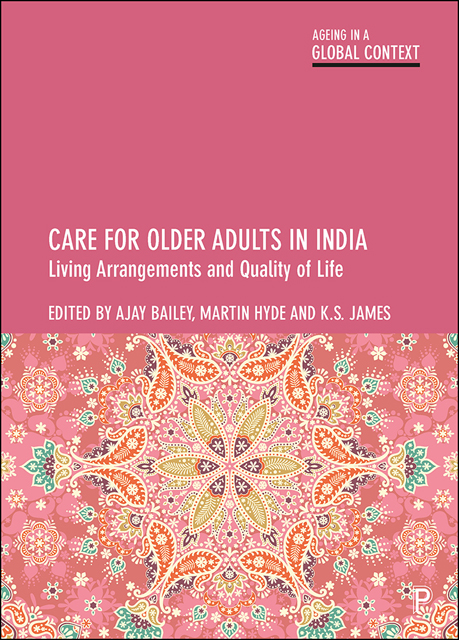Book contents
- Frontmatter
- Contents
- List of figures and tables
- Notes on the editors
- List of contributors
- Acknowledgements
- Series editors’ preface
- Map of India
- 1 Introduction: Living arrangements and care in India
- 2 Theorising care and relationships in the age of migration
- 3 Emerging living arrangements of older adults in India: patterns and welfare implications
- 4 Living arrangement concordance and the well-being of older persons in India
- 5 Family size and living arrangements among older adults in Kerala: panel data analysis, 2004– 19
- 6 Care arrangements for older adults: exploring the intergenerational contract in emigrant households of Goa, India
- 7 All my responsibilities towards my children are over! Linked lives and life course obligations among older adults with migrant children in India
- 8 Interpreting the landscapes of care for older men in Delhi and Kolkata: perspectives from care receivers and caregivers
- 9 The role of cultural meaning system and place attachment in retaining home ownership while residing in retirement homes in Kerala, India
- 10 Decision-making and choice or sine qua non? Care home entry in Tamil Nadu
- 11 Welfare and development programmes for older adults in India
- 12 Lessons and future directions for caregiving research in India
- Index
9 - The role of cultural meaning system and place attachment in retaining home ownership while residing in retirement homes in Kerala, India
Published online by Cambridge University Press: 13 October 2022
- Frontmatter
- Contents
- List of figures and tables
- Notes on the editors
- List of contributors
- Acknowledgements
- Series editors’ preface
- Map of India
- 1 Introduction: Living arrangements and care in India
- 2 Theorising care and relationships in the age of migration
- 3 Emerging living arrangements of older adults in India: patterns and welfare implications
- 4 Living arrangement concordance and the well-being of older persons in India
- 5 Family size and living arrangements among older adults in Kerala: panel data analysis, 2004– 19
- 6 Care arrangements for older adults: exploring the intergenerational contract in emigrant households of Goa, India
- 7 All my responsibilities towards my children are over! Linked lives and life course obligations among older adults with migrant children in India
- 8 Interpreting the landscapes of care for older men in Delhi and Kolkata: perspectives from care receivers and caregivers
- 9 The role of cultural meaning system and place attachment in retaining home ownership while residing in retirement homes in Kerala, India
- 10 Decision-making and choice or sine qua non? Care home entry in Tamil Nadu
- 11 Welfare and development programmes for older adults in India
- 12 Lessons and future directions for caregiving research in India
- Index
Summary
Introduction
Home is a place marked by many life course events. When an older adult leaves her/his home and starts to live in a retirement home she/he has to reconfigure their sense and meaning of home. The shift in place of residence is likely to bring about changes in control over a place (home) and the sense of place attachment (Heywood, 2005). Home can be central to many well-being factors for older adults such as care and care reciprocity (Ugargol and Bailey, 2020); domestic routine and rhythm (Lager et al, 2016); social relationship; religious and cultural practices (Mazumdar and Mazumdar, 2005; Bailey et al, 2008); life course events; material possessions; memories and emotional investments (Cristoforetti et al, 2011). Home is also embedded with memories, self-identity, sense of security, cherished possessions and family relations. In the Indian cultural context, older adult care is generally seen as a duty of adult children, which means the primary caregiver is usually the daughter-in-law (Liebig, 2003). Urbanisation and industrialisation have increased the workforce participation of all members of the household. This, coupled with migration of children, results in the non-availability of caregivers within the household (Nair and Kumar, 2017). As a result of these changes, formal care services for older adults have begun to receive considerable attention, especially in urban areas. Institutions providing geriatric care such as old age homes have become a source of formal care services as an alternative for traditional informal care services (Kalavar and Jamuna, 2011; Gupta et al, 2014; Bhattacharyya and Chatterjee, 2017; Mayer, 2017; Pathania et al, 2019). According to Muller (2019) relocation of housing is a complex decision-making process as changing the housing environment allows older adults opportunities for self-reflection and emotional regulation. Unlike in the Western context, this study shows that older adults living in for-profit care homes make efforts to retain and maintain their old home, as home is culturally as well as emotionally relevant in older adults’ lives.
This chapter focuses on three questions: i) what motivates older adults to retain their (previous) home while currently residing in retirement homes?, ii) how do older adults maintain their previous homes?
- Type
- Chapter
- Information
- Care for Older Adults in IndiaLiving Arrangements and Quality of Life, pp. 161 - 184Publisher: Bristol University PressPrint publication year: 2022
- 1
- Cited by



